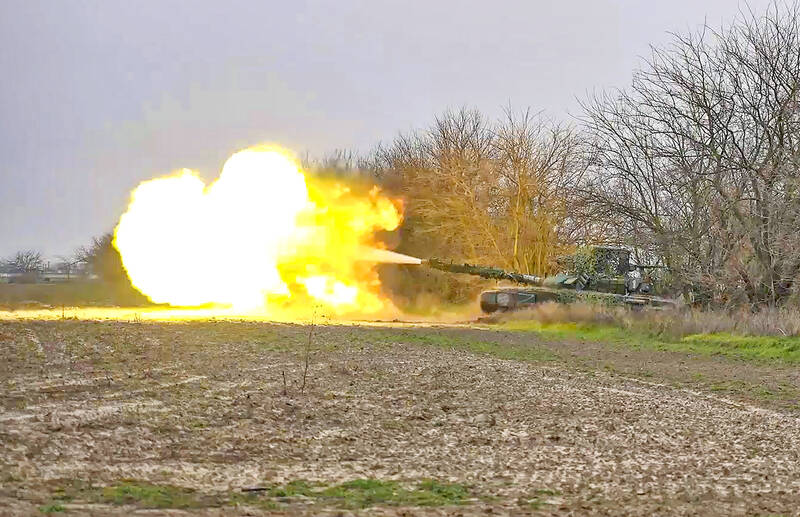About 20 percent of nitrocellulose — a compound used in gunpowder — imported into Russia has been sourced from Taiwan, a joint British-Ukrainian investigative report showed.
Nitrocellulose is a key component of smokeless gunpowder, and the EU has banned export of the compound to Russia due to its ongoing war of aggression against Ukraine.
The report said that nitrocellulose produced in Taiwan makes its way to Russia by passing through other countries such as Turkey. Only one company, T.N.C. Industrial Co (台硝), was named in the report, which also named China and Germany as key sources of the compound for Russia.

Photo: EPA-EFE
Before the war, EU countries such as Italy and the Netherlands were among the top 10 nitrocellulose suppliers to Russia, but have now stopped exporting the compound to Russia.
Between March 1, 2022, and Dec. 31 last year, 80 percent of Taiwan-made nitrocellulose that reached Russia had gone through a Turkish company called Noy Ic Ve Dis Ticaret Ltd Sti.
The report cited customs data from various countries and the UN Commodity Trade Statistics Database showing that Russia imported Taiwan-made nitrocellulose worth nearly US$5.43 million during this period. During the two-year period from 2019 to 2021, only about US$127,000 of Taiwan-made nitrocellulose was obtained by Russia. In 2022, the amount nearly doubled to about US$220,000, and then soared last year.
The report said that despite the increase, Taiwan-sourced nitrocellulose was still significantly less than that sourced from China, which reached US$160 million over the same period. However, prior to 2022 there were few records of China exporting nitrocellulose to Russia.
The investigation was carried out by the UK think tank Royal United Services Institute in cooperation with Ukraine’s Centre for Defense Strategies, and analyzed the channels of supply of raw materials for Russian ammunition production.
The report said that despite advances in defense technology, artillery and multiple-launch rocket systems still played the most important role in combat, with about 70 percent of battle losses on both sides attributed to artillery.
Although Russian officials have set a goal of producing 2 million rounds of artillery shells per year, this quantity would likely not meet the needs of the front line, and rapidly increasing domestic production capacity in the short term would be difficult, the report said. Affected by sanctions and transportation embargoes, Russia has had to step up its production of gunpowder and explosives, which require the import of raw materials, it said.
The report urged those selling raw materials used in ammunition to Russia to instead sell the materials to NATO countries to produce ammunition to aid Ukraine’s defense.

Taiwan is stepping up plans to create self-sufficient supply chains for combat drones and increase foreign orders from the US to counter China’s numerical superiority, a defense official said on Saturday. Commenting on condition of anonymity, the official said the nation’s armed forces are in agreement with US Admiral Samuel Paparo’s assessment that Taiwan’s military must be prepared to turn the nation’s waters into a “hellscape” for the Chinese People’s Liberation Army (PLA). Paparo, the commander of the US Indo-Pacific Command, reiterated the concept during a Congressional hearing in Washington on Wednesday. He first coined the term in a security conference last

Prosecutors today declined to say who was questioned regarding alleged forgery on petitions to recall Democratic Progressive Party (DPP) legislators, after Chinese-language media earlier reported that members of the Chinese Nationalist Party (KMT) Youth League were brought in for questioning. The Ministry of Justice Investigation Bureau confirmed that two people had been questioned, but did not disclose any further information about the ongoing investigation. KMT Youth League members Lee Hsiao-liang (李孝亮) and Liu Szu-yin (劉思吟) — who are leading the effort to recall DPP caucus chief executive Rosalia Wu (吳思瑤) and Legislator Wu Pei-yi (吳沛憶) — both posted on Facebook saying: “I

The Ministry of Economic Affairs has fined Taobao NT$1.2 million (US$36,912) for advertisements that exceed its approved business scope, requiring the Chinese e-commerce platform to make corrections in the first half of this year or its license may be revoked. Lawmakers have called for stricter enforcement of Chinese e-commerce platforms and measures to prevent China from laundering its goods through Taiwan in response to US President Donald Trump’s heavy tariffs on China. The Legislative Yuan’s Finance Committee met today to discuss policies to prevent China from dumping goods in Taiwan, inviting government agencies to report. Democratic Progressive Party Legislator Kuo Kuo-wen (郭國文) said

The Ministry of Economic Affairs has fined Taobao NT$1.2 million (US$36,900) for advertisements that exceeded its approved business scope and ordered the Chinese e-commerce platform to make corrections in the first half of this year or its license would be revoked. Lawmakers have called for stricter supervision of Chinese e-commerce platforms and more stringent measures to prevent China from laundering its goods through Taiwan as US President Donald Trump’s administration cracks down on origin laundering. The legislature’s Finance Committee yesterday met to discuss policies to prevent China from dumping goods in Taiwan, inviting government agencies to report on the matter. Democratic Progressive Party